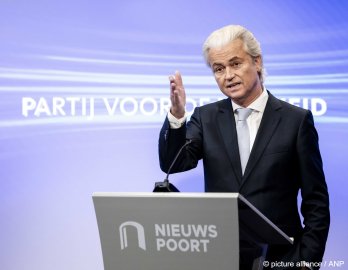Wilders’ Ultimatum: Potential Government Exit Over Asylum Policy
The political landscape in the Netherlands is currently experiencing turbulent times, primarily driven by the controversial stance of Geert Wilders, a prominent figure in Dutch politics. Wilders has issued a stark ultimatum to the ruling coalition regarding the country’s asylum policies, threatening to withdraw his party, the Party for Freedom (PVV), from the government. This situation has significant implications for immigration processes and policies in the Netherlands.
The Context of Wilders’ Ultimatum
Wilders’ ultimatum comes amid rising tensions surrounding asylum rules in the Netherlands. The ongoing debate over how to handle asylum seekers and the management of immigration has intensified, particularly as the country grapples with increasing numbers of individuals seeking refuge. Wilders argues that current policies do not adequately address the challenges posed by asylum applications, claiming they pose risks to national security and social cohesion.
Concerns Over Asylum Policies
One of the primary concerns raised by Wilders is the perceived leniency in asylum policies that are seen as encouraging more individuals to seek refuge in the Netherlands. He has voiced his discontent with the existing framework, suggesting that it fails to prioritize the needs of Dutch citizens and undermines the integrity of the immigration system. These sentiments resonate with a portion of the electorate who demand stricter controls on immigration and asylum procedures.
- Security Risks: Wilders points to potential security threats posed by refugees and asylum seekers, advocating for tougher vetting processes.
- Social Cohesion: He argues that an influx of asylum seekers could lead to social tensions, challenging the integration of newcomers into Dutch society.
- Political Responsibility: Wilders holds the ruling coalition accountable for what he sees as a failure to effectively manage asylum applications, leading to his ultimatum.
Implications for Immigration Policy
Should Wilders follow through on his threat to withdraw from the government, it could lead to significant shifts in immigration policy in the Netherlands. The potential departure of the PVV from the coalition may force other parties to reconsider their positions on asylum and immigration. This is particularly relevant given the ongoing discussions about humanitarian parole and the treatment of asylum seekers.
As the political situation develops, it’s crucial for stakeholders to monitor the impact on various immigration processes, including:
- Asylum Applications: Changes in policy could result in stricter requirements for asylum seekers and potentially longer processing times.
- Legal Framework: Any shifts in government could lead to revisions in immigration laws, affecting the rights of asylum seekers and their ability to secure residency.
- Public Sentiment: The ongoing debate may influence public opinion on immigration, which can further affect policymaking and community relations.
The Broader European Context
Wilders’ ultimatum is not an isolated event; it reflects a broader trend across Europe where various political figures and parties are pushing for stricter immigration controls. Countries like Italy and Hungary have already adopted stringent measures, and the Netherlands may follow suit if Wilders’ demands are met. This trend raises questions about the balance between humanitarian obligations and national security.
As Europe grapples with these challenges, the situation in the Netherlands serves as a microcosm of the ongoing tensions surrounding immigration policy. It highlights the ongoing struggle between accommodating asylum seekers and addressing the concerns of citizens regarding security and resources.
Conclusion
The ultimatum issued by Geert Wilders may have profound implications for the future of asylum policy in the Netherlands. As the government faces pressure to tighten immigration controls, the fate of countless asylum seekers hangs in the balance. Observers of immigration news in Europe should closely monitor how this political drama unfolds, as it may set a precedent for future policy decisions regarding asylum and immigration across the continent.
In a time of division and debate about immigration reform, it is essential for policymakers to strike a balance between respecting human rights and ensuring national security. The outcome of this political tussle could shape the landscape of immigration in the Netherlands and potentially influence broader European policies.










